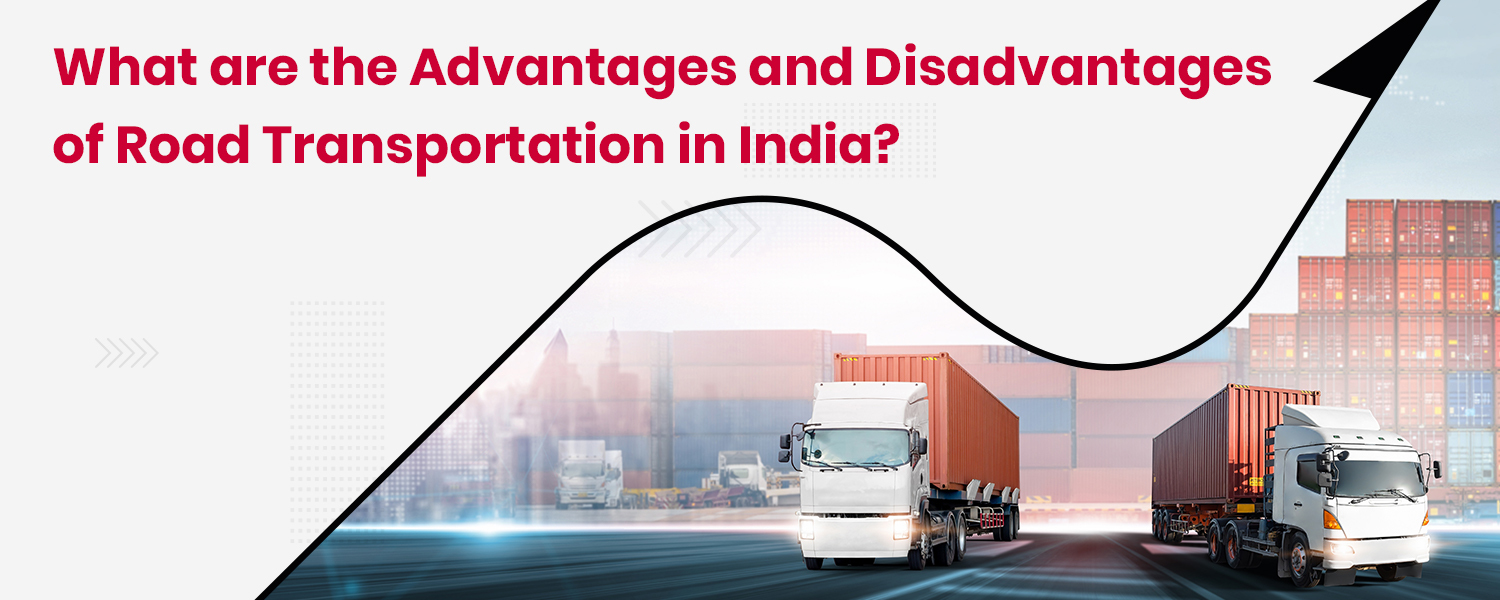As you start solving the complex logistics web, you’ll notice that what keeps the trade flowing is the vast networks of roads crisscrossing the country. An astounding 1,45,240 kilometers of roads run through the diverse landscapes of India, making it the second-largest road network globally. That’s why road transportation is the most crucial mode of logistics for eCommerce businesses.
In the logistics framework, road transportation is a pivotal strand, encompassing the movement of goods across the length and breadth of the country via an extensive network of roads. It carries aspirations and facilitates growth for the thriving eCommerce sector. However, with great potential comes a spectrum of challenges and triumphs.
In this blog post, we’ll explore the vital cog in the logistics machinery, the different advantages it offers to businesses, and its disadvantages.
Advantages of Road Transportation
Accessibility and Flexibility
The essence of road transportation lies in its remarkable ability to adapt. Unlike fixed rail tracks or predefined air routes, road transport offers the liberty to modify routes and schedules per evolving needs. This adaptability is crucial in a dynamic business environment where demands and destinations change rapidly. The road network’s extensive reach enables businesses to respond in real time to varying traffic conditions, road closures, or customer requests, ensuring that goods are always on the most efficient path to their destination. This flexibility is a significant boon for sectors like eCommerce, where customer satisfaction hinges on timely and responsive delivery services.
Door-to-Door Services
The door-to-door feature of road transportation is particularly beneficial in a country like India, where many destinations might be remote or not easily accessible by other modes of transport. Road transportation bridges this gap, delivering goods directly from the warehouse to the customer’s doorstep, thus eliminating the need for additional handling and transfers. This direct approach saves time and reduces the risk of damage during transit, ensuring that products reach their destination in pristine condition.
Cost-Effectiveness
Regarding the economics of transportation, road transport offers a compelling case. It typically incurs lower infrastructure and maintenance costs than air and rail transport. This translates to more affordable shipping options for businesses, especially for short to medium distances. The lower cost is a significant advantage for small and medium-sized enterprises (SMEs) and startups that operate on tighter budgets and need cost-effective logistics solutions to maintain competitive product pricing.
Speed and Efficiency
In logistics, where time equates to money, road transportation stands out for its speed and efficiency, especially over short and medium distances. Road transport offers a more direct and flexible approach than rail or air transport, which often involves longer processing times and potential delays due to scheduling and route limitations. Vehicles can swiftly navigate through varying terrains, bypassing the usual bottlenecks of busy airports or railway stations. This agility ensures that deliveries, particularly those with tight deadlines, are carried out swiftly, thereby maintaining the flow of goods and services promptly.
Ease of Tracking
Today, information is power, and road transportation offers a key advantage – the ease of tracking. Integrating advanced GPS and tracking systems has revolutionised how freight transportation is monitored and managed. These technological advancements enable businesses and customers to track the movement of goods in real time, offering a level of previously unattainable transparency. This is a game-changer for eCommerce businesses, as it allows them to provide customers with up-to-date information about their orders, enhancing customer satisfaction and trust.
Service to Remote Areas
India’s topography is marked by its vast and varied landscapes, from bustling urban cities to remote rural villages. Here, road transportation plays a crucial role in bridging the gap, offering the capability to reach destinations often inaccessible by other modes of transport. This aspect of road transport is vital for ensuring the inclusivity of rural areas in the nation’s economic activities. It enables the flow of goods to and from these remote locations, supporting local economies and fostering development.
Simplified Logistics and Lower Packaging Costs
One of the less heralded yet significant advantages of road transportation is its simplification of logistics operations and notably lower packaging costs. Unlike air or maritime transport, road transit often requires less elaborate packaging, primarily due to the reduced risk of extensive handling and less stringent requirements. This reduction in packaging complexity reduces material costs and streamlines the packing process, making it more efficient and less time-consuming.
Moreover, with its flexibility and reach, road transportation allows for more direct routes and fewer transshipment points. This directness reduces the operational complexities involved in coordinating multiple modes of transport, like the hub-and-spoke model, leading to a more streamlined, efficient logistics process.
Reduced Risk of Damage
A key advantage of road transportation is the reduced risk of damage to goods. This benefit stems from the lesser handling required during road transit than multimodal transportation involving air or sea freight. With fewer loading and unloading cycles, the likelihood of goods being damaged in transit significantly diminishes, aiding in shipping insurance coverage. Additionally, the direct nature of road transportation often means goods are loaded at the pickup point and then unloaded only at the final destination, further minimising the risk of damage.
Supporting eCommerce Growth
The rise of online shopping has brought the expectation of rapid delivery, sometimes even on the same day. Road transportation is uniquely positioned to meet these demands with its inherent speed, flexibility, and door-to-door service advantages.
Disadvantages of Road Transportation
Vulnerability to Weather Conditions
Road transportation is notably susceptible to adverse weather conditions. Heavy rains, floods, and dense fog can severely disrupt road transport services, leading to significant delays. This vulnerability not only affects delivery timelines but also increases the risk of accidents on the roads. During monsoons or extreme weather events, the road network’s efficiency drops markedly, impacting the reliability of this mode of transportation. For businesses, this means factoring in potential delays and having contingency plans, especially during known weather disruptions.
Risk of Accidents and Breakdowns
Road transport carries a higher probability of accidents and vehicle breakdowns than other modes of transportation. The safety concerns associated with road transport are significant, with traffic incidents posing risks to the cargo and the personnel involved. These risks are exacerbated by driver fatigue, inadequate vehicle maintenance, and challenging road conditions. This necessitates investing in robust safety protocols and reliable vehicle maintenance practices for businesses.
Limitations for Heavy and Bulk Cargo
Transporting large volumes and heavy cargo efficiently is a notable challenge in road transportation. This limitation often necessitates specialised vehicles and additional logistics planning, particularly for bulky items. The requirement for specific types of trucks and equipment to handle heavy loads adds to the complexity and cost of road transport. This can be a significant limitation for businesses dealing with large-scale shipments or heavy industrial goods.
Slower Speed Compared to Air or Rail
When it comes to long-distance transport, roadways generally fall behind in speed compared to air or rail transportation. This is particularly relevant for time-sensitive shipments where delays can have cascading effects on the supply chain. While road transport is effective for short to medium distances, its suitability diminishes over longer routes where speed is of the essence.
Inconsistency in Service Quality
The quality of service in road transportation can vary greatly among different providers. This inconsistency can pose challenges in maintaining a uniform standard of service, especially for businesses operating across different regions. The disparity in service quality can stem from factors such as varying levels of professionalism, technological adoption, and operational capacity among transport providers.
Lack of Organisational Structure
The road logistics sector often exhibits an unregulated and fragmented nature. This lack of standardisation and organisation can lead to inefficiencies and difficulties in implementing industry-wide best practices. For businesses, navigating this fragmented landscape can be challenging, requiring a deeper understanding of local logistics dynamics and provider capabilities.
High Dependency on Fuel Prices
Fluctuations in fuel prices significantly impact road transportation. This high dependency on petroleum products as the primary energy source for vehicles makes road transport costs susceptible to market changes in fuel prices. Such variability can lead to unpredictability in transportation costs, affecting business budgeting and pricing strategies.
Infrastructure Challenges
Finally, road maintenance, traffic congestion, and inadequate infrastructure challenges can significantly affect road transportation efficiency. These infrastructure challenges slow down the movement of goods and contribute to increased wear and tear on vehicles, thereby elevating operational costs.
Conclusion
The dynamism of road transportation, with its unparalleled reach, flexibility, and adaptability, forms the bedrock upon which eCommerce businesses can build their delivery promises and customer satisfaction.
In this context, the emergence of innovative solutions like NimbusPost guides businesses through freight forwarding via road, helping them find the most efficient, reliable, and cost-effective road transportation services. With NimbusPost’s courier recommendation engine, businesses can make informed decisions, selecting the right courier services that align perfectly with their logistics needs and customer expectations.




